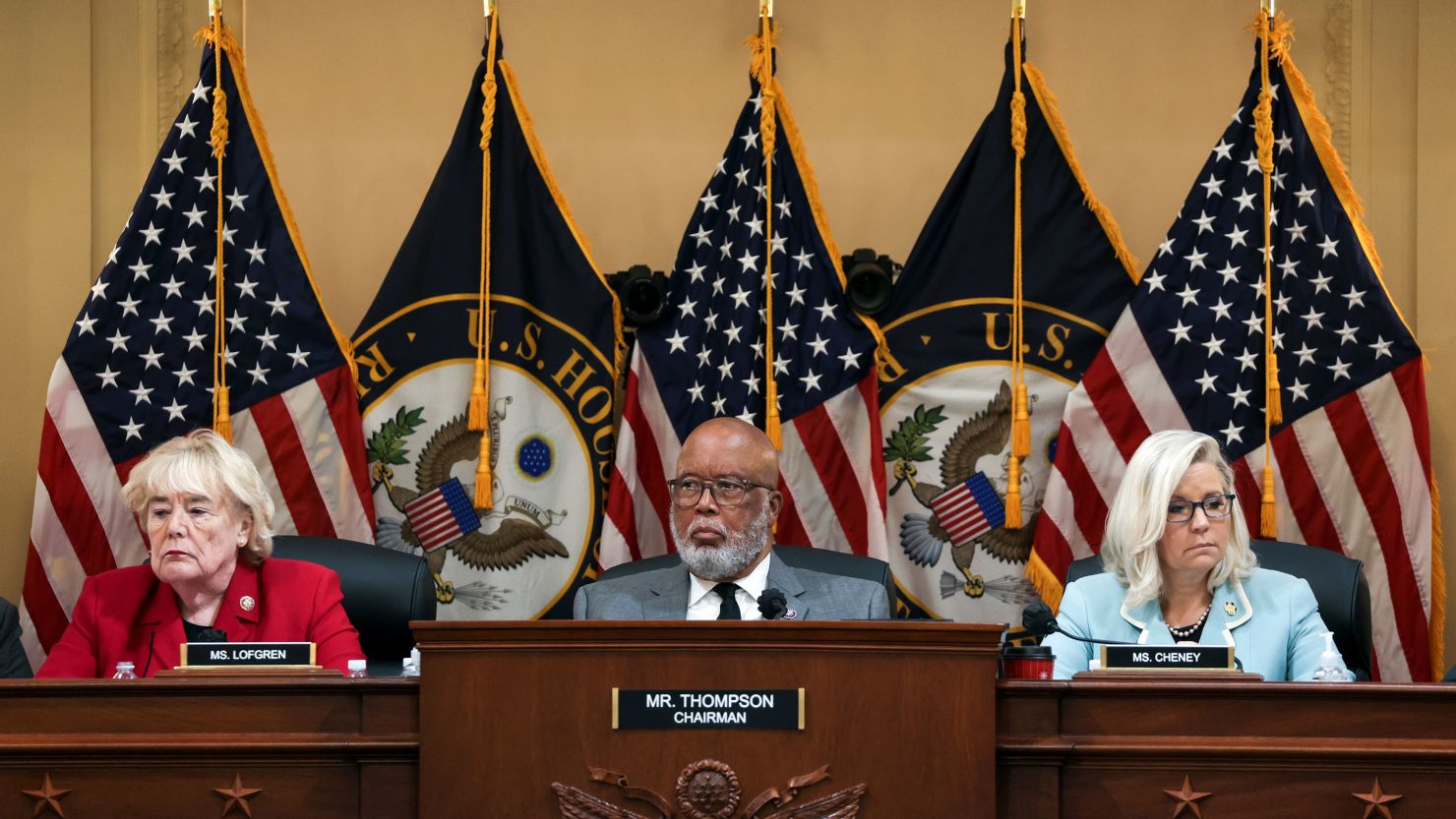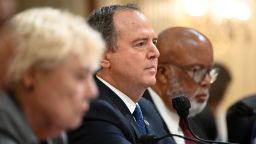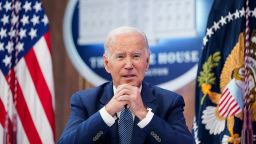The House select committee investigating the US Capitol insurrection long ago dropped the notion of being a narrowly focused quest for the facts as members use their probe to try to defend democracy in its intensifying struggle with Donald Trump.
The panel returns to the public eye Thursday after its late-summer break with a televised hearing that sources tell CNN will serve as a pre-midterms warning that the ex-President is a clear and present danger to free elections.
But are the American people listening? And do the committee’s efforts to undermine Trump’s cadre of election denier candidates in 2022 and vow to ensure he never again tastes presidential power have any chance of success?
While there are scores of Republican nominees running for federal and state positions on a platform of Trump’s lie that the 2020 was stolen, this year’s tumultuous campaign is most notable for other issues that have overtaken the shockwaves of the assault on the Capitol only 21 months ago.
New Consumer Price Index data released on Thursday showed that inflation rose 8.2% in September year-on-year. By one measure, the cost-of-living index returned to its highest level since August 1982 last month. On a monthly basis, overall consumer prices increased by 0.4% from August.
Republicans are sketching a dystopian picture of a nation in the grip of a crime wave to try to turn the election into a referendum on President Joe Biden. While the President claimed Trump’s “MAGA” fans had embraced “semi-fascism” and some Democratic campaigns have run ads warning of an autocratic GOP, Democrats are running far harder on the conservative Supreme Court majority’s overturning of abortion rights and their new law trimming some prescription drug costs.
Polls repeatedly show that voters see the economy – a far more visceral issue in daily life than the threat to American democracy – as their top concern. Their anxiety was explained by the latest inflation data. Grocery bills are just a pain right now. Frozen potato products are up 10%, pork products that are not sausages are 5.5% more expensive, according to US Producer Price Index data released on Wednesday. While it would be too simplistic to say voters are more preoccupied with the cost of French fries than the price of democratic freedoms, it wouldn’t be far from the mark.
New CNN/SSRS poll numbers published Thursday show that the economy and inflation are especially concerning to voters in competitive congressional districts. While 59% of registered voters nationwide call the economy extremely important to their vote, that rises to 67% in these districts. The share calling inflation that important rises from 56% to 64%.
An increasingly political committee
Given the increasingly strident warnings from committee members about the danger that Trump-backed candidates pose to democracy, it’s hard not to see Thursday’s January 6 hearing as an intervention in the midterms. And since Trump is already a hot favorite for the GOP’s 2024 presidential nomination, warnings of committee members from both parties that he must never hold office again are by definition highly political.
Democratic Rep. Jamie Raskin, a member of the panel from Maryland, told CNN’s Wolf Blitzer on Wednesday that the hearing would sound the alarm about Trump’s continuing incitement and his pollution of the 2022 election with voter fraud falsehoods.
“There continue to be subtle calls for … violence, things like saying, Mitch McConnell, the Senate Minority Leader has a death wish,” Raskin said, referring to comments the former President made about the Kentucky Republican. “And the refusal of huge numbers of Trump-inspired candidates to accept the reality of Trump’s defeat in 2020, when Joe Biden beat him by more than 7 million votes, 306 to 232 in the Electoral College,” the Maryland lawmaker added.
“So the electoral denialism is rampant and there continue to be, you know, very scary intimations about embrace or tolerance of political violence.”
The committee, of course, is about more than politics. It has built an investigative record for posterity. It has portrayed the attack on the Capitol in graphic terms. It has shown that many of those who stormed the Capitol did so in the belief they were acting on Trump’s orders. Using testimony from brave Republicans who stood up to the ex-President, the committee has unpacked his relentless scheme to steal power. The probe has shown Trump made a deliberate choice not to intervene when his mob threatened the lives of lawmakers. And it has documented the fate of those like two former Georgia election workers who faced an onslaught from Trump partisans simply for their role in making sure the voice of the people was heard in the 2020 election.
And the impact of the committee’s work could also unfold in the months and years ahead, especially if it factors into assessments of Trump’s fitness for office in a possible 2024 general election campaign. The committee may already have played a critical role in shaping public opinion about January 6 in the event that the Justice Department ultimately decides to make indictments following its separate investigation into the events surrounding that day.
Judging the committee’s impact outside Washington
But since committee members have portrayed their work in such political terms, it is also fair to consider its effectiveness as a political entity.
The panel’s run of televised summer hearings was effective, and in their highly produced and prosecutorial style set a new precedent for how the formal theatrics of a congressional investigation could be modernized. Some of that momentum appears to have ebbed, however, over their late summer break. And there will need to be shocking new evidence and story lines on Thursday to make a major impact in the frenetic final days of the midterm election showdown.
But while the committee had transfixed Washington, there is little evidence to suggest that it has dominated conversations outside the capital, in a nation still struggling to shake off the deprivations of a once-in-a-century pandemic and coping with raging inflation and growing fears of a recession.
There has been no comparable national moment of shock and understanding that took place during the Senate Watergate hearings that opened in 1973 and held America spellbound. That might not be the committee’s fault.
Given the fractured state of the media and the polarization of the country, shared national moments of catharsis are now rare. And tens of millions of voters have been convinced by Trump’s false claims of election fraud that are pumped out around the clock by conservative media. So, many minds were certain to remain closed, however damning the committee’s findings. That is the nature of modern US politics.
Cheney’s warning as Trump gears up for 2024
The most striking example of this can be seen in the wreckage of Rep. Liz Cheney’s congressional career. The committee’s vice chair knew she was sacrificing her role near the top of the GOP with her outspoken criticism of Trump over his assault on democracy, having already lost her leadership position in the House Republican conference over it.
But she also failed to convince Republican voters back home in Wyoming that the threat to American democracy was the biggest concern. She lost her primary by a landslide to a Trump-backed rival, underscoring that in most of the Republican Party, there is no market for a message that Trump represents a mortal threat to free elections.
Still, Cheney is promising she’s hardly started and is committed to opposing any White House run by the former President, who continues to flirt with incitement at his raucous rallies.
“I think that what you’ve seen consistently and increasingly is Donald Trump continuing to suggest and to say the same things that we know caused violence on January 6,” Cheney told CNN.
Some Democrats have used the shenanigans that followed the 2020 election to slam their Republican opponents. Nevada Sen. Catherine Cortez Masto, who’s widely seen as the most vulnerable Democrat in the Senate, accused GOP opponent Adam Laxalt of being “the face of Donald Trump’s campaign to overturn Nevada’s election results” in one recent spot. And a Democratic Congressional Campaign Committee ad in North Carolina’s competitive 13th Congressional District blasts Republican nominee Bo Hines for saying the 2020 election was stolen from Trump and for siding with him on defunding the FBI.
But the economy remains the driving force in the midterms. In a new CNN/SSRS poll released on Wednesday, Biden’s approval rating did tick up – to 44%. But only 36% of US adults approved of his handling of the economy. And a bare 32% were happy with the way the President is tackling inflation.
Inflation is such a pernicious force – especially in the way it drains the finances of those who can least afford it and is felt in every aspect of daily life – so it’s not surprising it’s at the forefront of voters’ minds as the election looms.
But the difficulty that democracy proponents have had in turning their fight into a defining political issue – at least in these midterm elections – underscores the findings of experts who have studied the rise of authoritarian societies abroad. Often, voters only realize that their democracy is dying is when it’s too late.




